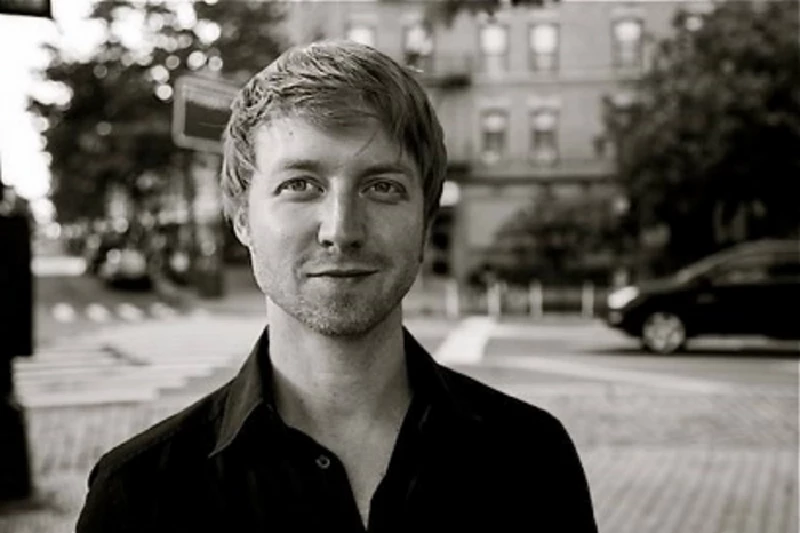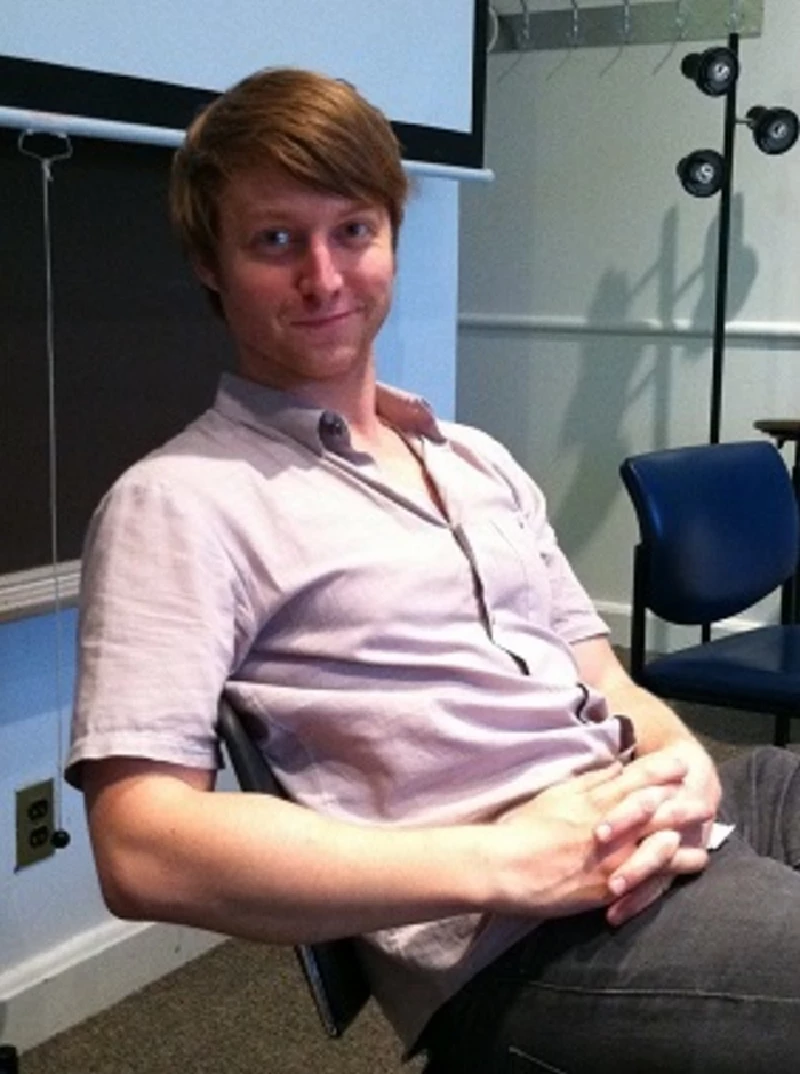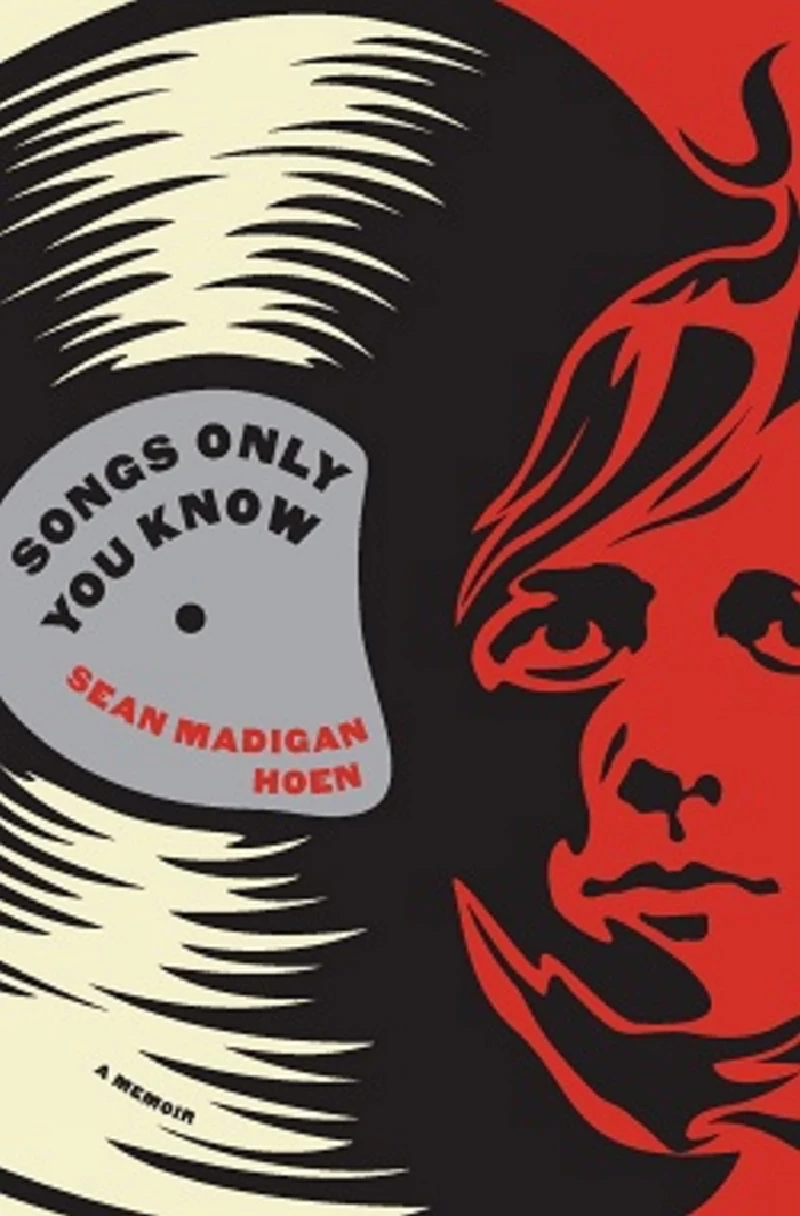Sean Madigan Hoen - Interview
by Lisa Torem
published: 6 / 6 / 2014

intro
Lisa Torem chats to Detroit-based author and former 90's punk musician Sean Madigan Hoen about his memoir, 'Songs Only You Know'
When reading Sean Madigan Hoen’s visceral journey through the 1990s, ‘Songs Only You Know’, I zeroed in on the Detroit native’s struggle with identity, emotional commitment, transformative friendships and familial regrets and frustrations. On one page, he’s a pent up ball of fire flanking an aluminum bat; later he’s an All-American singleton sprawled over a mattress besides a few buddies, a half-drunk six-pack and take-out; and even further down the gritty Detroit streets he’s a remorseful, reflective fur ball as he contemplates the past and begins to reconstruct his future. Such is the human condition, and Sean Madigan Hoen, even when recounting hazy days and war-like weekends, manages to hone in on his agony and infatuations like a seasoned cinema director with a funky, somewhat distorted hand held lens. Although Sean downplays his role in several Detroit bands, his performances in Thoughts of Ionesco, Leaving Rouge and the Holy Fire attracted a loyal following and his songwriting output was prolific. That said, his second career, as an author seems to have benefitted from those drug-addled, playful and formative days. Pennyblackmusic spoke to Sean Madigan Hoen both about ‘Songs Only You Know’ and his musical career. PB: You fronted the punk band Thoughts of Ionesco in Michigan during the 1990s. Band mate/drummer Brian Repa, a central and colourful character in your book, left the band several times and then came back. How did that affect the continuity? Repa and bassist Nathan Miller continued to work with you even as you formed alternate bands later on. How would you describe your interpersonal and working relationships? SMH: Well, I wouldn’t call my involvement in music a career. More like disenchanted twenty-year olds driving around in a van that smelled heavily of young man musk and failure. And one thing I praise about those times is that kind beast, my friend Repa. He works in trucking now and lives with two greyhounds, rescued track dogs, on the outskirts of Portland—of all places for a freaky daddy like him. But he lives out his weirdness still. He surely does. Repa always leaves the band or gets kicked out, but no one can ever replace him—that’s the everlasting problem. You can’t out-vibe him. I love him. He’s got the wild heart of a wounded animal. PB: After performing in TOI, a trio, you formed Leaving Rouge in the early 2000s. There you had a revolving door of players and you forged an entirely new sound. How would you describe that transition and what followed musically? SMH: As a nineteen-year old maniac, that wild, grimy, technically absurd music came really easily to me—whatever awful sounds I wanted to make flowed right out of me. Those screams hurt like heaven once I got good at them, and all it took was blowing out my voice ten or so times. Dousing the vocal chords with coffee and alcohol was part of the technique and, hell, it worked back then. We just went insane—that was the whole trip. So, when life events rendered TOI’s brand of crazy-core music irrelevant to my emotional scope, I quit and, at the ripe old age of twenty-two, began making really sad guitar rock music that ranged from horrible to endurable. I could write hundreds of songs and there was always something wrong with them—and I knew it. That was the nature of that period of my music making. PB: Whilst running Leaving Rouge you also formed the Holy Fire in 2004. In which band did you feel the most stable and productive? Which songs made the biggest impression on your following? SMH: I’ve never been in a stable band. Stable musicians used to really scare me; I couldn’t relate to their musical desires. I don’t think any of my songs made an impression on anyone, other than a few friends—that’s kind of the beauty of the whole experience. Leaving Rouge had a song called ‘Sleep Now Forever’ that was never recorded properly, but it’s out there and still speaks to those times - I’d love to do that one again, because I can sing it better now. The Holy Fire blew it when we recorded with Michael Ivins, who’s in the Flaming Lips. He liked us. We had some dark guitar rock songs that weren’t so bad, but I sang abominably at the session. We tracked a song called ‘Dreams to Spend’ that was better than, say, Creed or Nickleback was in 2004—I can say that, at least—but my voice is real thin on the track because my lifestyle wasn’t jiving with mother nature. Most of that music was white guy rock, though, like the Replacements when they polished things up too much. I wasn’t seeing clearly. PB: Your solo album, ‘The Liquid Witch’, featured more of your skills as a singer-songwriter. Although the album featured quite a few emotional ballads, the song ‘Upstairs Bedroom’ was specifically bittersweet. What was the back-story? SMH: Wow, you’re going deep, but I know exactly what you’re talking about. ‘Upstairs Bedroom’ was a hidden track, that old trick where you’d sneak one onto the end of a CD, after a few moments of digital silence. That song was recorded on an 8-track in my apartment—real cheap. But it’s actually about the guy Will from my book: that’s him talking right before it starts. The song is about wanting to keep him alive. It would have been a good one if I’d done it in a real studio. PB: In Chapter 1, you write that when you attended Mass, the melodies you heard there influenced your musical output. How so? Can you also discuss the songwriters/composers that have influenced your writing the most? SMH: By writing, do you mean my prose? I don’t write music anymore, at least not that I share with anyone. But I think all music influences my prose. I listen to a lot of raw, old free jazz to try opening up some headspace before I write—it helps me get away from the computer vibrations. I’ll listen to electronic composers, too, though, like Stars of the Lid and Tim Hecker. PB: According to your book, on your twenty-second birthday you decided not to “scream your songs.” But you also mention that you still hadn’t discovered your actual voice. So once you decided to actually sing rather than scream, did your ideas about lyrics and performing live and in the studio change? How did this drastic change affect your audience base? SMH: I characterise these changes in the book. Basically, I couldn’t go nuts anymore onstage. I had no drive to activate those animal expressions—there was nothing in it for me. The results would have been too serious; because, really, you’re performing when you’re onstage, no matter how much you make it about anti-performance. I couldn’t perform my rage anymore because it was too real. My life had changed drastically and suddenly. So there I was singing really sad music out of tune, standing on stages where a year earlier I’d gashed my head open or something. People hated it and in some cases stopped talking to me. That’s the interesting part of the story—not the music—just the human awkwardness. PB: You got to a point where you wanted to throw your guitar in the lake because you were so frustrated with your career. Can you describe that turning point? SMH: It wasn’t just music I was frustrated with—the pie in the sky had carbosized into a black, crusty dung pile. Chucking the guitar was one of those addict-mind ideas: “I’ve gotta sacrifice my prized possession, my instrument, in the name of spiritual progress. It’s gotta hurt real bad, if it’s going to effect a change in my spiralling life.” Some people out there know how this feels. Many don’t, and god bless ‘em. PB: Having been a big part of the Michigan punk scene and the subsequent singer-songwriter scene, what would you say were the highlights and regrets of your musical career? SMH: Highlights, really, were when the music worked its magic, whether onstage or at practice. When the sounds took over and we were in a moment—nothing better than being truly in a moment, enraptured. The rest is all silly business. One of the weirdest was when someone got the insane idea to have me open for Avril Lavigne in front of 10,000 confused young girls. I took the gig, because how do you turn down something that ridiculous. I brought Repa as my road crew. I remember him screaming at Avril’s handlers, “Aye, we need some beer for the entertainment.” And, sure enough, they brought us a case and a few green bananas, too. Weird, huh? True story PB: What are your current musical tastes? SMH: Ah, everything. Genius shit, as I think of it. I don’t care about genre, just give me the genius shit and I’ll learn something. PB: When tragedy strikes in your book, you walk us through your every emotion even when it is heart wrenching. It appears that you have held little back. At that start of the process, did you set out to write in such an introspective manner or did you surprise yourself? Was it difficult or liberating? SMH: If I was going to write about some of those things, I was going to do it with the full force of my spirit and intellect and emotional core—there was never any question about that. It was difficult, but no more than dragging all those memories around for the previous decade. What do you do with all that? I tried to write the best book I could. PB: Although this is your story, it reads as a novel. What I mean is that your mastery of metaphor and place really shines through. Which writers have influenced you the most and at what point did you find your voice? SMH: You’re always finding your voice—it’s ever changing and so hard to fully embody, but writing is really the best way to get in touch with what you need to say. I love a million writers, but Denis Johnson is dear to me, and Robert Stone, and Tobias Wolff. Don Delillo and Joan Didion. I read books every month that change my life for the better. There’s incredible stuff going on right now, works of literary art too few people treat themselves to. Akhil Sharma has a new novel out. He’s just another genius whose books belong on the shelves of households worldwide. PB: You have taught writing classes at Columbia University. Are you still teaching? If so, what’s the most important lesson you can pass on to an emerging writer? SMH: I love teaching. I’m doing a bit of it this summer. You know, for a writer, it’s just about getting to that stuff inside yourself that only you can offer up to the world. You start there and try to find a language for it, see what it looks like and sounds like and feels like. The lesson is that lying to yourself or being lazy makes for tainted words. PB: You write a great deal about the sometimes-complex relationships you shared with your parents and sister Caitlin. Why was it important for you to keep your musical identity somewhat separate from your family? When did you know it was the right time to share these stories? SMH: I wrote the book because I had to. Really, I started writing it one day and found that I couldn’t turn back. It just wasn’t an option. The book was trying to own me and I had to make it mine, and then I had to make peace with its ass. PB: You endured a lot of personal tragedy at a relatively young age. Your vivid descriptions of substance abuse, alcohol addictions and a tough music industry sounded challenging. At the end of the day, how do you feel you got through all of this and what advice could you offer to a young person whose life feels out of control? SMH: I have no shyness about saying that AA saved my life. I’d tried a lot of things, but if you’ve really hit your bottom, that’s a place you can go to learn what to do. You hear it from people who know, who’ve been there. PB: Are you a disciplined writer with a set schedule or do you write randomly? SMH: It feels more compulsive than disciplined. When I’m going strong, I write every night. Too late. I’m trying to flip that schedule, but I don’t know how all these people write in the mornings. I’ve always been better acquainted with nighttime. PB: Now that you have finished your first book and received favourable reviews, what’s next? SMH: I can’t see too far ahead—it’s real blurry up there, but there’s another book involved. A novel. It’s just about continuing to work, and wanting to feel justified in doing so. PB: If you had to describe your current life philosophy in a few sentences, what would you say? SMH: I’m trying to harmonise with what is, as it is, because I’m sure as hell not running the show. And thanks for this interview. PB: Thank you, Sean.
Picture Gallery:-


features |
|
(Raging Pages) Songs Only You Know (2014) |

|
| In the second instalment of her new book series 'Raging Pages', Lisa Torem examines ex-punk musician Sead Madigan Hoen's new memoir, 'Songs Only You Know' |
most viewed articles
current edition
Carl Ewens - David Bowie 1964 to 1982 On Track: Every Album, Every SongArmory Show - Interview with Richard Jobson
Colin Blunstone - Thalia Hall, Chicago, 16/7/2025
Visor Fest - Valencia, Spain, 26/9/2025...27/9/2025
John McKay - Interview
Bathers - Photoscapes 1
Billie Eilish - O2 Arena, London, 10/7/2025
Loft - Interview
Robert Forster - Interview
Sir Tim Rice - Interview
previous editions
Heavenly - P.U.N.K. Girl EPManic Street Preachers - (Gig of a Lifetime) Millennium Stadium, Cardiff, December 1999
Beautiful South - Ten Songs That Made Me Love...
Oasis - Oasis, Earl's Court, London, 1995
Prolapse - Interview
Peter Perrett - In Dreams Begin Responsibilities Interview Part One
Coldplay - Wembley Arena. London, 16/8/2022
Boomtown Rats - Ten Songs That Made Me Love....
Trudie Myerscough-Harris - Interview
Pixies - Ten Songs That Made Me Love...
most viewed reviews
current edition
Davey Woodward - Mumbo in the JumboAmy Macdonald - Is This What You've Been Waiting For?
Sick Man of Europe - The Sick Man of Europe
Lucy Spraggan - Other Sides of the Moon
Phew, Erika Kobayashi,, Dieter Moebius - Radium Girls
Suzanne Vega - Flying With Angels
Alice Cooper - The Revenge of Alice Cooper
Bush - I Beat Loneliness
Blueboy - 2
Cynthia Erivo - I Forgive You
Pennyblackmusic Regular Contributors
Adrian Janes
Amanda J. Window
Andrew Twambley
Anthony Dhanendran
Benjamin Howarth
Cila Warncke
Daniel Cressey
Darren Aston
Dastardly
Dave Goodwin
Denzil Watson
Dominic B. Simpson
Eoghan Lyng
Fiona Hutchings
Harry Sherriff
Helen Tipping
Jamie Rowland
John Clarkson
Julie Cruickshank
Kimberly Bright
Lisa Torem
Maarten Schiethart